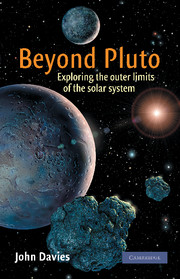Book contents
- Frontmatter
- Contents
- Preface
- Acknowledgements
- Prologue
- 1 The edge of the solar system
- 2 The Centaurs
- 3 The mystery of the short-period comets
- 4 Shooting in the dark
- 5 Deeper and deeper
- 6 Sorting out the dynamics
- 7 What are little planets made of?
- 8 Numbers and sizes
- 9 Things that go bump in the dark
- 10 Dust and discs
- 11 Where do we go from here?
- 12 Will we ever get our names right?
- Appendix 1 Dramatis personae
- Appendix 2 Guidelines for minor planet names
- Index
Prologue
Published online by Cambridge University Press: 01 October 2009
- Frontmatter
- Contents
- Preface
- Acknowledgements
- Prologue
- 1 The edge of the solar system
- 2 The Centaurs
- 3 The mystery of the short-period comets
- 4 Shooting in the dark
- 5 Deeper and deeper
- 6 Sorting out the dynamics
- 7 What are little planets made of?
- 8 Numbers and sizes
- 9 Things that go bump in the dark
- 10 Dust and discs
- 11 Where do we go from here?
- 12 Will we ever get our names right?
- Appendix 1 Dramatis personae
- Appendix 2 Guidelines for minor planet names
- Index
Summary
In July 1943 the Journal of the British Astronomical Association published a short article entitled ‘The Evolution of our Planetary System’. The paper had been submitted by a retired Irish soldier and part-time amateur theoretical astronomer, Lt-Col. Kenneth Edgeworth. Despite being greatly reduced in length due to wartime shortages of paper, the article contained a prophetic paragraph on the structure of the solar system. While discussing comets, Lt-Col. Edgeworth remarked, ‘It may be inferred that the outer region of the solar system, beyond the orbits of the planets, is occupied by a very large number of comparatively small bodies.’ Kenneth Edgeworth did not live to see his prediction confirmed, but almost 50 years later just such an object was discovered. This new body, initially called simply 1992 QB1, was the harbinger of a breakthrough in our understanding of the solar system. Within a few years hundreds of similar objects would be found in what, by an ironic twist, soon became known as the Kuiper, rather than Edgeworth, Belt.
- Type
- Chapter
- Information
- Beyond PlutoExploring the Outer Limits of the Solar System, pp. xiiPublisher: Cambridge University PressPrint publication year: 2001



